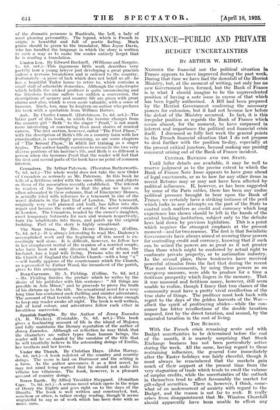FINANCE-PUBLIC AND PRIVATE
BUDGET UNCERTAINTIES
BY ARTHUR W. KIDDY.
NEITHER the financial nor the political situation in France appears to have improved during the past week. During that time we have had the downfall of the Herriot Ministry, but, at the moment of writing, not only has no new Government been formed, but the Bank of France is in what I should imagine to be the unprecedented position of having a note issue in excess of that which has been legally authorized. A Bill had been prepared by the Hcrriot Government conferring the necessary powers for extension, but it had not become law before the defeat of the Ministry occurred. In fact, it is this irregular position as regards the Bank of France which seems almost, for the moment, to have surpassed in interest and importance the political and financial crisis itself. I discussed so fully last week the general points in the French financial situation that I do not propose to deal further with the position to-day, especially at the present critical juncture, beyond making one passing comment arising out of the lank of France incident.
CENTRAL BANKING AND THE STATE.
Until fuller details are available, it may be well to reserve judgment as to the precise extent to which the Bank of France Note Issue appears to have gone ahead of legal enactments, or as to how far any other items in recent Returns may or may not have been affected by political influences. If, however, as has been suggested by some of the Paris cables, there has been any undue political pressure brought to bear upon the Bank of France, we certainly have a striking instance of the peril which lurks in any attempts on the part of the State to control such matters as credit and currency which long experience has shown should be left in the hands of the central banking institution, subject only to the definite laws laid down by previous legislation. This is a point which requires the strongest emphasis at the present moment—and for two reasons. The first is that Socialistic Governments have always aimed at securing these powers for controllingcredit and currency, knowing that if such can be seized the powers are as great as if not greater than those which might be conferred by actual right to confiscate private property, or to nationalize industry. In the second place, these tendencies have received powerful stimulus from the fact that during the recent War most Governments, by using these powers as an emergency measure, were able to produce for a time a fictitious prosperity which lingers in the memory. That it was unsound and fictitious many, however, still seem unable to realize, though I fancy that two classes of the community must have a pretty vivid recollection of the true state of things. The profiteer must look back with regret to the days of the golden harvests of the War— albeit the spirit of profiteering abides—while the consumer has bitter recollections of the double taxation imposed, first by the direct taxation, and second, by the concealed taxation in the cost of living.
THE BUDGET.
With the French crisis remaining acute and with Budget uncertainties to be determined before the end of the month, it is scarcely surprising that Stock Exchange business has not been particularly active during the week. All the same, having regard to these restraining influences, the general tone immediately after the Easter holidays was fairly cheerful, though it must always be remembered that the markets gain much of their support at the present time from the very stagnation of trade which tends to swell the volume of surplus credits, while the uncertainties of the outlook in themselves tend to affect favourably the market for gilt-edged securities. There is, however, I think, somewhat of an undercurrent of anxiety with regard to the Budget, and the reason is not far to seek. It really arises from disappointment that Mr. Winston Churchill should apparently have been unable to effect any










































 Previous page
Previous page